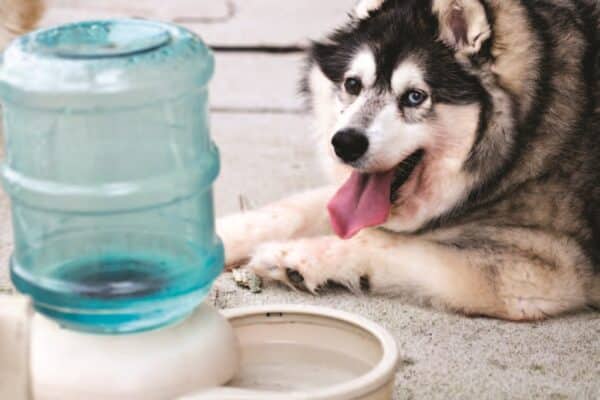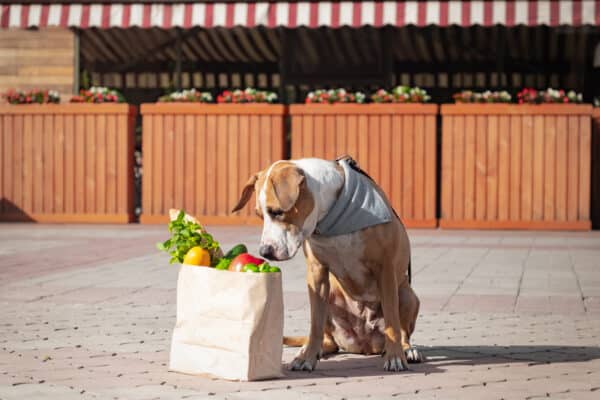Denise Fleck has no clue how old her newly adopted dog, Kiko, really is. She guesses that her Akita rescue is between 7 to 10 years old, confirming that she is a senior dog. All Denise can verify is that by providing a quality-nutrient diet and supplements to Kiko, she now sports a shiny coat, is at a healthy weight and emits ageless energy.
“They say 50 is the new 30, so in dog years, that makes an 8- or 9-year-old canine, 3 or 4!” she says.
Denise is nationally known as the Pet Safety Crusader for her pet first-aid classes and pet-safety books. But she also champions the needs of senior dogs as president of The Grey Muzzle Organization (greymuzzle.org) that strives to improve the lives of at-risk senior dogs. This nonprofit group includes renowned veterinarians Marty Becker, Ernie Ward and Heidi Lobprise on its advisory board.
Senior Dog Nutritional Needs
Meeting the nutritional needs of gray-muzzled dogs is a top priority for Denise and her organization.
“There is no one-type-fits-all food for older dogs, as their needs differ,” Denise says. “My feeling with my senior dogs, and I’ve now had a full dozen, is most things in moderation, nothing in excess. With Kiko, I continue to watch how she responds to her diet and supplements and make any adjustments if need be.”
Dr. Jean Hofve, a holistic veterinarian in Jamestown, Colorado, agrees that there is no one super food or diet that will meet the nutritional needs of all senior dogs.
“Senior dogs need more nutrition and better-quality protein and fat because they don’t digest or absorb food as well,” she says. “Their stomachs get worn out through aging.”
That’s why Dr. Hofve advocates providing older dogs with what is called symbiotics. It is a combination of omega-3 fatty acids, prebiotics and probiotics.
“Omega-3 fatty acids are very important for senior dogs because they are antioxidants, have anti- inflammatory properties and are also good for their joints and help with arthritis pain,” Dr. Hofve says. “Prebiotics and probiotics given together work together in the body to improve digestion and the immune system.”
Drink Up!
Also a biggie on Dr. Hofve’s list for senior dogs: plenty of water.
“I recommend canned foods over dry foods for senior dogs because they are easier to digest and contain more moisture,” she says. “Also consider giving your dog bone broth — make sure it is free of any salt or onions.”
Another senior dog advocate is Susan Blake Davis, CCN, a certified clinical nutritionist and licensed pet nutritionist who founded Ask Ariel.com (askariel.com), a website with a lineup of veterinarian-recommended pet supplements. She shares her home with Legend, a special-needs rescue dog with severe hip dysplasia and epilepsy who is nearly 13 years old.
“Legend eats a raw, frozen diet with raw, freeze-dried treats and lots of vegetables,” Susan says. “Raw, frozen diets are low in carbohydrates and are especially helpful for pets with allergies, skin problems and digestive issues.”
Senior Supplements
Like Dr. Hofve, Susan also highly recommends supplementing a senior dog’s diet with quality supplements. “Pet vitamins and supplements can assist with digestion and nutrient absorption, help keep your pet’s coat and skin healthy, and strengthen joints and bones,” Susan says. “A good, multi-strain probiotic will contain many strains of beneficial bacteria to help your pet’s immune system to fight harmful bacteria, yeast and parasites.”
Bottom line for your senior dog: Acknowledge that every day we get to spend with them is a gift. That’s a promise people like Denise Fleck are keeping for senior dogs like Kiko. As Denise says, “Dogs are living longer, healthier lives thanks to better nutrition, exercise and becoming part of the family unit.”
Know Your Vitamin A-B-Cs
Consult your veterinarian about identifying specific vitamins and other supplements that can maximize your older dog’s health. Here’s a rundown of vitamins and the health roles they can play in senior dogs:
Vitamin A: Aids the aging immune system
Vitamin B: Helps enzyme function, the brain and regulates energy
Vitamin C: This antioxidant boots out toxins in the body and tones down inflammation
Vitamin D: Promotes healthy bones
Vitamin E: Helps metabolize fat and supports eyes and muscles

Take a Peek at Some Senior Eats!
Whereas there used to be puppy food or adult food, now there is a variety of senior dog foods available in pet stores near you or online. We share three of them and what makes them good for seniors: low calorie, easy to digest and ingredients that benefit older dogs.
- Go! Solutions Carnivore Senior Diet: Includes taurine for vision and health, glucosamine and chondroitin for hips and joints, 394 kcal per cup. Available in dry and wet. $40.99/12-lb. bag.
- Royal Canin Early Cardiac (vet prescription): Highly palatable, digestible, includes arginine, carnitine, taurine, omega-3 fatty acids and moderate sodium restriction for heart health, 290 kcal per cup. Available in dry and wet. $69.99/17.6-lb. bag.
- Purina Pro Plan Bright Mind Adult 7+ Senior Small Breed Chicken & Rice: Includes glucosamine and chondroitin for hips and joints, fatty-acid MCT to improve cognitive thinking, 487 kcal per cup. Large breed and wet also available. $45.99/16-lb. bag.
- Wellness Core Grain-Free Senior Deboned Turkey Recipe: Includes taurine for vision and health, glucosamine and chondroitin for hips and joints, 359 kcal per cup. Available in dry and wet. $42.99/12-lb. bag.





